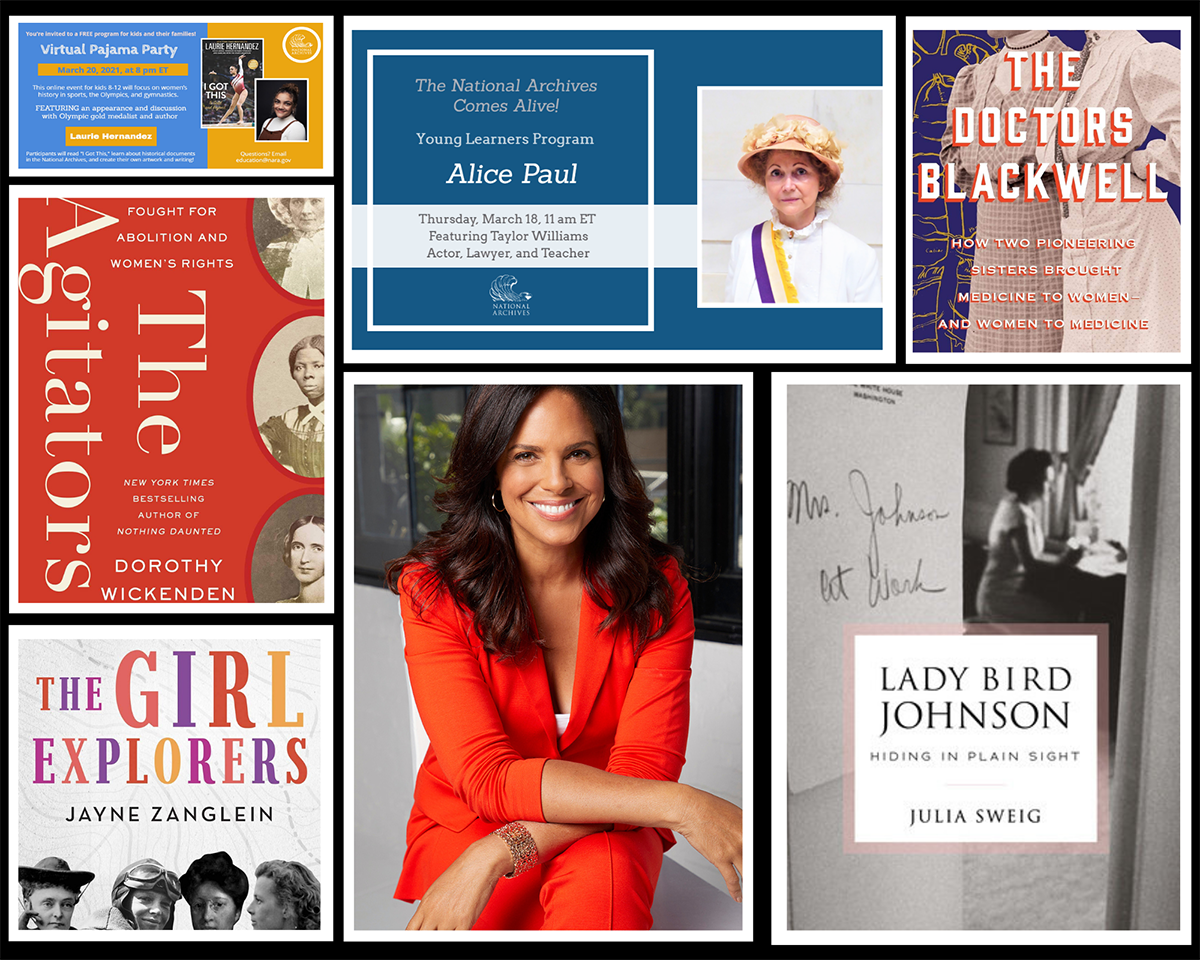
Virtual Programs Commemorate Women’s History Month
By Michael Davis | National Archives News
WASHINGTON, April 1, 2021—The National Archives celebrated Women’s History Month throughout March with a variety of livestreamed public programs. The wide range of topics included women in medicine, women athletes, First Ladies, abolitionists, explorers, suffragists, and women in the military.
 All programs were free, open to the public, and are available for viewing on the National Archives YouTube channel.
All programs were free, open to the public, and are available for viewing on the National Archives YouTube channel.
On March 5, Janice Nimura discussed her book, The Doctors Blackwell: How Pioneering Sisters Brought Medicine to Women and Women to Medicine.
“I discovered the Blackwell story for the first time five years ago, despite the fact that I am born, raised, and lived in the city where they practice―New York,” Nimura said.
The author shared how Elizabeth Blackwell, the first woman in America to receive an M.D. degree, and her younger sister, Emily, both exploded the limits of possibility for women in medicine by founding the New York Infirmary for Indigent Women and Children, the first hospital staffed entirely by women.
Watch it: The Doctors Blackwell: How Pioneering Sisters Brought Medicine to Women and Women to Medicine
On March 9, author Jayne Zanglein discussed her book, Girl Explorers: The Untold Story of the Globetrotting Women Who Trekked, Flew, and Fought Their Way Around the World. The book focuses on the founding of the Society of Woman Geographers―an organization of adventurous female world explorers―and on how key members served as early advocates for human rights and paved the way for today’s women scientists.
“I didn't know about [the Society of Woman Geographers] before I started writing the book,” Zanglein said. “I discovered them while I was researching the author Blair Niles. She was one of the founders of society, and I was very intrigued with her and I wanted to write a book about women explorers.”
On March 15, author Julia Sweig discussed her book, Lady Bird Johnson: Hiding in Plain Sight, which tells the First Lady’s story in her own words.
The program was presented in partnership with the Lyndon Baines Johnson Presidential Library.
“We’re fortunate to have Mrs. Johnson’s audio daily diary recorded on 123 hours of tapes preserved at the LBJ Library, which is one of the 14 Presidential Libraries administered by the National Archives and Records Administration,” said Archivist of the United States David S. Ferriero. “These recordings, which the library has made publicly available on its website, allow us to hear firsthand how Lady Bird was the President’s most trusted advisor.”
Watch it: Lady Bird Johnson: Hiding in Plain Sight
On March 18, in a young learner’s program, children and other viewers met Alice Paul, portrayed by Taylor Williams of the American Historical Theatre.
“Alice Paul was a supreme strategist who revitalized the women’s suffrage movement in the early 20th century with determination, resolve, and unique plan to convince the nation that women deserve the right to vote,” said Education Specialist Missy McNatt.” The presentation was followed with a question-and-answer session.
Watch it: Meet Alice Paul!
On March 20, the National Archives hosted a virtual pajama party for kids aged 8–12. The event focused on women in sports, the Olympics, and gymnastics. The special guest was Olympic gymnastics gold medalist and Dancing with the Stars champion Laurie Hernandez, who read from her book, I Got This: To Gold and Beyond.
Watch it: Virtual Pajama Party
On March 30, author Dorothy Wickenden talked about her book The Agitators, and shared stories of abolition, the Underground Railroad, the early women’s rights movement, and the Civil War. Wickenden’s book highlights the perspective of three friends and neighbors in mid-19th-century Auburn, NY. Harriet Tubman, a “conductor” of the Underground Railroad, hid those she rescued in the basements of her friends, Martha Wright and Frances Seward. Wright, a Quaker mother of seven, worked with Susan B. Anthony and Elizabeth Cady Stanton to advance women’s suffrage. Seward, wife of Secretary of State William Seward, helped support, feed, and educate those fleeing slavery while lobbying her husband on the need for immediate abolition.
“Everyone knows about [Harriet] Tubman’s heroic exploits on the Underground Railroad in the 1850s, but few people are familiar with the rest of her life,” Wickenden said. “In particular her extraordinary friendship with Frances Seward and Martha Wright. They were co-conspirators in what turned out to be the second American Revolution; these are the agitators.”
Watch it: The Agitators: Three Friends Who Fought for Abolition and Women’s Rights
On March 31, Broadcast journalist Soledad O’Brien moderated a panel discussion, titled “Overcoming Challenges: Women in the Military,” on the evolution of women’s roles and responsibilities in the U.S. Armed Forces. O’Brien interviewed Heather A. Wilson, former Secretary of the Air Force, retired U.S. Army Brig. Gen. Kristin K. French, and U.S. Army Lt. Madison Hovren.
“Women have fought for our nation from its earliest years, but it took more than a century before women were able to enlist and serve in uniform,” Ferriero said. “America’s entry into World War I marked the first time women were able to serve in roles other than nursing. In the ensuing decades, rules for women in the military expanded. Women achieved officer rank, took on leadership roles, gained access to service academies, and fought for equal footing with men in combat.”
Watch it: Overcoming Challenges: Women in the Military with Soledad O’Brien
See our extensive related Women’s History Month online resources.